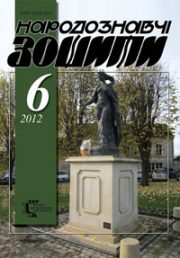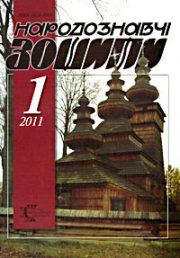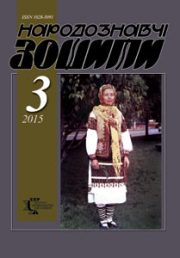The Ethnology Notebooks. 2021. № 4 (160), 810—817
UDK930:[929І.Боберський:061.2](477.83/.86:712.743)” 190/193″
DOI https://doi.org/10.15407/nz2021.04.810
COOPERATION BETWEEN IVAN BOBERSKY AND THE PROSVITA SOCIETY (FIRST THIRD OF THE XX CENTURY)
SOVA Andriy
- ORCID ID: https://orcid.org/0000-0003-0548-4975
- Doctor of Historical Sciences, Associate Professor,
- Associate Professor of Olympic Education
- Lviv State University physical culture named after Ivan Bobersky,
- 11, Kosciuszko street, 79007, Lviv, Ukraine;
- senior researcher at the Department of Modern History
- Institute of Ukrainian Studies I. Krypyakevych
- of the National Academy of Sciences of Ukraine,
- 4, Kozelnytska street, 79026, Lviv, Ukraine,
- Contacts: e-mail: sovaandrij1980@gmail.com
Abstract. Among the prominent Ukrainian figures of the late ХІХ — first half of the ХХ century a prominent place is occupied by the ascetic of the Ukrainian national idea Ivan Bobersky (1873—1947) — teacher, organizer, translator, journalist, editor, publisher, public, military, political and statesman, founder of Ukrainian physical education, athlete, philanthropist, photographer, archivist, connoisseur of several European languages. Living in Lviv during 1901—1914 and working as a teacher, and later as a professor (1905) of German language and gymnastics (engines), head of the German-language library of the Academic Gymnasium (1901—1918 (with breaks)) and its branch (1906—1914), the Women’s Teachers’ Seminary (1903—1905) and the Basilian Sisters Gymnasium (1906—1914) in Lviv, he actively immersed himself in social and cultural work. During this period he was a member and collaborated with many societies, including Prosvita.
In 1920—1932, while living in Canada, Ivan Bobersky joined the Ukrainian Institute «Prosvita» in Winnipeg.
This topic is not covered in Ukrainian historiography, which is the novelty of the proposed publication.
The purpose of the study is to comprehensively analyze the cooperation of Ivan Bobersky with the society «Prosvita».
The chronological boundaries of the study cover the years 1901—1932.
Territorial borders cover Galicia (1901—1919) and Canada (1920—1932).
The methodological basis of the article is the principles of historicism and objectivity. The source base for writing the article was the documents of the Prosvita society, including reports, minutes of meetings, appeals and commemorative books; reports and periodicals of the Sokil-Batko organization; notes, articles and memoirs of Ivan Bobersky; memories of contemporaries.
Keywords: Ivan Bobersky, Prosvita, Halychyna, Lviv, Canada, Winnipeg, social and cultural activities.
Received 1.06.2021
REFERENCES
- Sova, A. (2017). Ivan Bobersky is a leading figure of the Ukrainian falconry movement. Ukraine: cultural heritage, national consciousness, statehood (Issue 30, pp. 3—22). Lviv [in Ukrainian].
- Sova, A. (2019). Participation of Ivan Bobersky in the Shevchenko Scientific Society on the eve of the First World War. Ukraine: cultural heritage, national consciousness, statehood (Issue 32, pp. 257—265). Lviv [in Ukrainian].
- Sova, A. (2017). Ivan Bobersky is the founder and ideological inspirer of the Ukrainian Sports Club at the Academic Gymnasium in Lviv. Galicia. Scientific and cultural-educational regional journal (Vol. 29—30, pp. 166—175). Ivano-Frankivsk [in Ukrainian].
- Sova, A. (2018). Activities of Ivan Bobersky in the «Teachers Community». Scientific notes of Ternopil National Pedagogical University named after Volodymyr Hnatyuk. Series: History (Issue 2, pp. 103—107). Ternopil [in Ukrainian].
- Sova, A. (2014). Ivan Bobersky contribution to the formation of the Plast organization. Scientific notebooks of the historical faculty of Lviv University. Collection of scientific works (Issue 15, pp. 85—95). Lviv [in Ukrainian].
- Sova, A. (2016). Ivan Bobersky and the sports society «Ukraine»: the formation of the Ukrainian sports tradition in Galicia. Bulletin of Lviv University of Trade and Economics (Issue 14, pp. 68—75). Lviv [in Ukrainian].
- Blazejowskyj, D. (1995). Historical schematism of Peremyshl including the apostolic administration of Lemkivshchyna (1828—1939). Lviv [in Polish].
- Nazarko, I. (1976). Leading priest from Boykivshchyna. Chronicle of Boykivshchyna, 2/24, 38—42 [in Ukrainian].
- (1919). O. Mykola Bobersky. Illustrated calendar of the Prosvita society with a literary collection for the leap year 1920. Lviv [in Ukrainian].
- Chaban, L. (2005). The Bobersky family. Proceedings of the fourth interregional genealogical conference «Ukrainian family tree» March 27—28, 2004 (Pp. 108—133). Lviv [in Ukrainian].
- Central State Historical Archive of Ukraine, Lviv (herein after — CDIAL of Ukraine). F. 366 (Ivan Bobersky (1873—1947), teacher, organizer, Ukrainian sports movement in Galicia and abroad, chairman of the Sokil-Batko society in Lviv, professor). Op. 1. Ref. 4 (Letters of the Prosvita Society in Lviv and Zagreb and the Sokil Gymnastics Society in Lviv on the establishment of the Prosvita branch in Sambir, gratitude for financial assistance, distribution of the almanac Carpathian Ukraine in Struggle, etc.) [in Ukrainian].
- Levytsky, K. (1926). History of political thought of Galician Ukrainians 1848—1914. Based on memories. Lviv: Own edition [in Ukrainian].
- Bryk, I., & Kotsyuba, M. (Eds.) (1910). Editing. (Introduction). Commemorative book: The first Ukrainian educational and economic congress was organized by the Prosvita Society in the fortieth anniversary of its founding in Lviv on February 1 and 2, 1909: Minutes and abstracts (Pp. V—IX). Lviv: Cost and circulation of the Prosvita Society [in Ukrainian].
- Bryk, I., & Kotsyuba, M. (Eds.) (1910). Congress participants. Commemorative book: The first Ukrainian educational and economic congress was organized by the Prosvita Society in the fortieth anniversary of its founding in Lviv on February 1 and 2, 1909: Minutes and abstracts (Pp. 641—655). Lviv: Cost and circulation of the Prosvita Society [in Ukrainian].
- (1910). Report «Sokola-Bat’ka» in Lviv for the year 1909. Lviv: Circulation «Sokola-Bat’ka» [in Ukrainian].
- Bobersky, I. (1910). How we still collected folds for national purposes, and how we still have to collect them. Commemorative book: The first Ukrainian educational and economic congress was organized by the Prosvita Society in the fortieth anniversary of its founding in Lviv on February 1 and 2, 1909: Minutes and abstracts (P. 193). Lviv: Cost and circulation of the Prosvita Society [in Ukrainian].
- Bobersky, I. (1910). The importance of motor societies. Commemorative book: The first Ukrainian educational and economic congress was organized by the Prosvita Society in the fortieth anniversary of its founding in Lviv on February 1 and 2, 1909: Minutes and abstracts (Pp. 239—245). Lviv: Cost and circulation of the Prosvita Society [in Ukrainian].
- Goruk, S. (1910). Firefighters «Sokoly». Commemorative book: The first Ukrainian educational and economic congress was organized by the Prosvita Society in the fortieth anniversary of its founding in Lviv on February 1 and 2, 1909: Minutes and abstracts (Pp. 245—246). Lviv: Cost and circulation of the Prosvita Society [in Ukrainian].
- Rybchakivna, I. (1910). Folk entertainments and playgrounds. The role of women in awakening social life in the countryside. Commemorative book: The first Ukrainian educational and economic congress was organized by the Prosvita Society in the fortieth anniversary of its founding in Lviv on February 1 and 2, 1909: Minutes and abstracts (Pp. 209—212). Lviv: Cost and circulation of the Prosvita Society [in Ukrainian].
- Zakhariyiv, I. (1910). Organization of friendly life of peasants. Commemorative book: The first Ukrainian educational and economic congress was organized by the Prosvita Society in the fortieth anniversary of its founding in Lviv on February 1 and 2, 1909: Minutes and abstracts (Pp. 212—220). Lviv: Cost and circulation of the Prosvita Society [in Ukrainian].
- Gritsay, O. (1913). In «Sokola-Bat’ka». Interview. Lviv [in Ukrainian].
- Boberskyi, I. (1939). Ukrainian sokilstvo (1894—1939). Lviv: Sokil-Batko Publisher [in Ukrainian].
- Biletska, M., Bobersky, I., & Vesolovsky, J. and others (1909). Ukrainian People of Galicia. The People’s Word. Illustrated, popular educational, political and literary journals, 194. Lviv [in Ukrainian].
- (1909). Meeting of the Department. Chronicle of the Shevchenko Scientific Society in Lviv (Issue 2, part 38, pp. 1—4). Lviv [in Ukrainian].
- Central State Historical Archive of Ukraine, Kyiv. F. 1235 (Hrushevsky — historians, linguists). Op. 1. Ref. 29 (Diplomas, membership cards, certificates and notices of election as a member of the Shevchenko Scientific Society, the Society for the Development of Russian Art (Lviv), the Czechoslovak Scientific Society and other societies and communities) [in Ukrainian].
- CDIAL of Ukraine. F. 312 (Ukrainian Sports Association «Sokil-Batko», Lviv). Op. 1. Ref. 62 (Appeals to the Ukrainian population, clippings of articles from Ukrainian and Polish newspapers, correspondence and other materials on the preparation and holding of the first regional congress of falcons in Lviv on September 10, 1911) [in Ukrainian].
- (1913). Report Society «Prosvita» on its activities for the period from January 1, 1910 to December 31, 1912. Lviv [in Ukrainian].
- Hayduchok, S. Memories. Private archive of Stepan Haiduchok (Lviv) [in Ukrainian].
- Bobersky, I., Tsegelsky, L., & Voloshin, M. and others (1914). To our regiments in Galicia. News from Zaporizhzhia. Rukhanka, Zmag, Firefightering, Travel, Plast, Shooting, 95—96). Lviv [in Ukrainian].
- Bobersky, I. Do not bend your head! Ukrainian National Museum in Chicago [in Ukrainian].
- Kumka, M. (1927). How to conduct a native school in Canada. New Field. Canadian Almanac (Pp. 12—25). Winnipeg [in Ukrainian].
- Kumka, M. (1925). The beginnings of the engine among Ukrainians in Winnipeg. Winnipeg [in Ukrainian].







